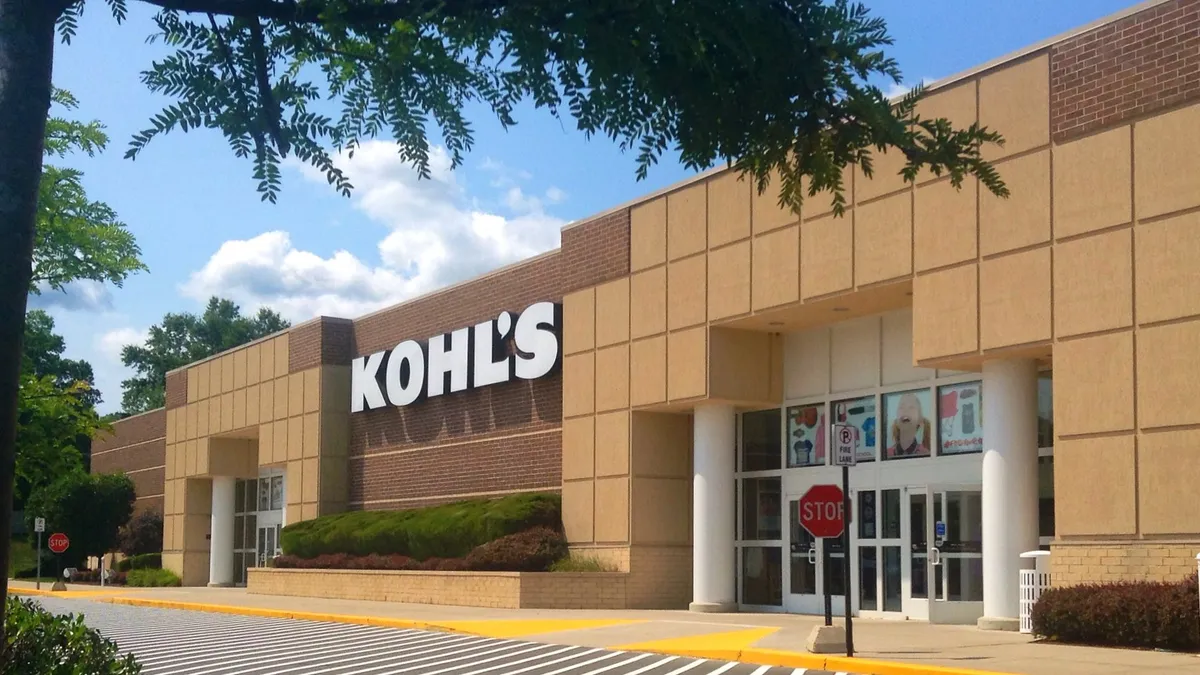Dive Brief:
-
Kohl’s last week said it’s mulling how to monetize its real estate, according to the press release announcing its rejection of a $53-per-share takeover bid from Franchise Group.
-
In May 2020, the department store conducted a sale-leaseback of its San Bernardino, California, e-commerce fulfillment and distribution center, which generated net proceeds of $193 million after fees and a gain of $127 million, according to its Q2 2020 earnings statement filed with the Securities and Exchange Commission.
-
But Kohl’s said the circumstances were unique and otherwise has fought any notion of sale-leasebacks, in a March filing calling them “an inefficient source of financing that would negatively impact margins by adding unnecessary rent expenses in perpetuity and risk Kohl’s investment-grade rating.” Credit analysts last month also warned the maneuver would rob Kohl’s of assets while adding to its expenses.
Dive Insight:
Kohl’s didn’t come out and say it in its press release last week, but it seems to have changed its mind about sale-leasebacks, which entail selling property then paying rent on it to its new owner.
“‘Monetization of real estate’ is Kohlese for ‘trade cash inflow today for rent payments tomorrow,’” Erik Gordon, professor at the University of Michigan's Ross School of Business, said by email. “It isn’t a way to improve sales and profits.”
Kohl’s itself last year seemed to realize this. The company made that clear when it rejected sale-leasebacks, including in its annual report, which contains a litany of reasons why it couldn’t or shouldn’t pursue financing that way.
Those included sale-leasebacks’ inefficiency; addition of operating risk; likely negative impact to Kohl’s investment-grade status; significant increase to rent expense; debt increase; disruption of Kohl’s focus on operating margin expansion; and diversion of cash flow. The retailer also said its bond indenture restricts its ability to enter into sale-leaseback transactions.
In March last year, according to Kohl’s transcript of the Bank of America Consumer & Retail Technology Conference, CEO Michelle Gass said “that particular idea doesn't make sense for us.”
”We think we have other alternatives that are more accretive to the value of the company,” she said.
These days, though, the company is running out of options. Its weak performance, downgrade of its own forecasts and the end of acquisition talks are rattling investors. That could be at least partly why the company seems newly open to the sale and leaseback of some stores, although Kohl’s may yet decide it’s not worth pursuing, according to GlobalData Managing Director Neil Saunders.
“At the end of the day, Kohl’s poor performance has put management in a weak position,” he said by email. “They are going to have to throw at least a few crumbs to investors to keep them satisfied.”
A sale-leaseback strategy could generate a windfall for investors, Saunders noted. Sears has gone down that road, monetizing real estate and other assets amid a steep but yearslong decline.
“It didn’t save Sears,” Michigan’s Gordon said. “It won’t save Kohl’s. Retailers save themselves by doing better retailing.”
In fact any proceeds from sale-leasebacks could help with that, Saunders said. “If money is invested in the business to improve the proposition or revamp stores then it may generate payback,” he said. “If money is simply distributed to investors then, as legitimate as that is, it will probably weaken Kohl’s future prospects.”
But it invites all the trouble previously laid out by Kohl’s itself.
“It will ultimately weaken the Kohl’s balance sheet,” Saunders said. “That’s not good if they wish to raise debt as they may incur a lower rating and higher interest rates. Leasebacks may also increase costs going forward, which is also unhelpful to a business like Kohl’s – especially at a time when inflation is pushing up other costs.”















